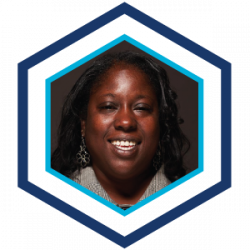 Dr. Adrienne Coleman
Dr. Adrienne Coleman
Director of Diversity, Equity, and Inclusion
- I grew up on the south side of Chicago with my parents Robert and Helen, brother Jason, and dog Sugar. My parents instilled in me a strong sense of Black pride, compassion, and love. Growing up, my parents had my brother and I involved in so many activities, golf on Monday, piano on Tuesday, flute on Thursday and ballet on Saturdays. A fun fact, I actually played golf with and won the Quaker Oats Groundbreaker Awards for Blacks in sports alongside Tiger Woods! During my high school years, I became interested in social justice issues as a result of experiences of racial discrimination while attending a predominately white, all girls Catholic high school. This interest turned into passion during my undergraduate and graduate school years, where I studied racial health disparities as a public health major. Eventually, I landed at Rutgers University where I taught Health and Social Justice, as well as assisted in the development of a social justice minor. A life-changing moment was when I had the opportunity to go to Moldova to strategize on confronting human trafficking. It inspired me to learn about other cultures and continue using my voice to confront social injustice! In fact, pre-COVID, I spent time traveling the world studying the trans-Atlantic slave trade and advancing racial equity in Brazil, Ghana, Belize, Panama, and Cuba. Please let me know if you want to hear some great stories and see some awesome pics of my adventures! Before I conclude this section, I cannot fail to mention that I’m a proud member of Zeta Phi Beta Sorority, Inc. This is important, as involvement in a Black Greek Organization assisted me, and has guided so many in creating a positive racial identity, while developing leadership, advocacy, and entrepreneurial skills.
What is your favorite IMSA memory?
- This is difficult to respond to, as I’ve had so many great moments at IMSA. From working the PROMISE program with Dr. White and Quinton, to developing the Leading Student to Success Program with CLED students (shout-out to alum Brittany Taylor who was instrumental in the development of LS2S), to working with PME to create their microaggression video (shout-out to alum Yasmin Broy), to mentoring SIR students researching racial inequities in STEM (checkout Yes, STEM is for All and the Extent of Implicit Bias in Gifted Students), to developing the Equity and Excellence policy, plan and scorecard with Dr. Torres and Traci Ellis, to co-facilitating several times with Dr. Anjur at IAGC, to my hallway conversations with so many of you, and I mustn’t fail to mention my visits to Student Life and the IRC for a “mental health break” with Minerva and Angie, as well as “the man” Keith McIntosh back in the day. Just to name a few!
What is your biggest motivation?
- When I think of my overall development, my parents and brother always supported me and allowed me to be my true, genuine self, a quirky, adventurous, thoughtful and caring introvert, even though many believe that I’m an extrovert. They are a source of constant motivation to continue progressing in life. The IMSA students have also been a source of motivation, as they challenge me in a different way each year that I’ve been at IMSA. My new team, Amberly and Rodrigo are also sources of motivation, as we together, along with all of you, are advancing Equity and Excellence at IMSA.
What are some of the biggest challenges you face?
- It’s sometimes difficult to be a Black person at IMSA. Reading remarks from surveys that refer to Black people, including myself, as incompetent, hearing stories that individual(s) are tired of me throwing my “Blackness” in their face, being told that a Black and Latinx faculty/staff group that convened to academically and socially-emotionally support Black/Latinx students must disband, listening to Black/Latinx students share stories that they feel invisible and are often told that they don’t belong at IMSA, and constantly having to defend diversity, equity, and inclusion work. This is exhausting and sometimes traumatic! Walk a mile in my shoes, have a conversation with me, don’t judge me, erase the stereotypical perspectives that you have of me, get to know me, see my “Blackness”, and understand that it is the most important part of my identity!
What is your personal vision for IMSA?
- It is widely known that IMSA is a national and global leader in STEM, but what many do not know is that IMSA is a leader in the secondary education space regarding the advancement of diversity, equity, and inclusion. IMSA is in a position to contribute to best practices, considering the process utilized in developing the Equity and Excellence policy, plan, and scorecard, that all of you took part in. As a matter of fact, IMSA’s work will be highlighted at the Athens Institute of Research and Education Conference in May. This will build upon both our national and global influence. My vision for IMSA is that:
- We all see the value add of focusing on equity-mindedness and cultural responsiveness,
- We minimize educational inequities by race, socio-economic status, and geographic location,
- We are a safe, inclusive, equitable environment, as it relates to race, gender, and sexuality,
- We continue to advance equity and excellence at IMSA, and
- We advance the human condition through sharing our Equity and Excellent work with the global world!


